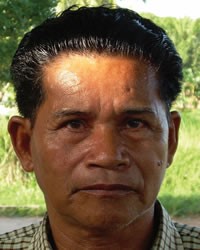Lampung Sungkai in Indonesia

Photo Source:
Copyrighted © 2026
Anonymous All rights reserved. Used with permission |
Send Joshua Project a map of this people group.
|
| People Name: | Lampung Sungkai |
| Country: | Indonesia |
| 10/40 Window: | Yes |
| Population: | 108,000 |
| World Population: | 108,000 |
| Primary Language: | Lampung Api |
| Primary Religion: | Islam |
| Christian Adherents: | 0.52 % |
| Evangelicals: | 0.01 % |
| Scripture: | New Testament |
| Ministry Resources: | Yes |
| Jesus Film: | Yes |
| Audio Recordings: | Yes |
| People Cluster: | Lampung of Sumatra |
| Affinity Bloc: | Malay Peoples |
| Progress Level: |
|
Introduction / History
The Sungkai have a strong social structure and make up their own subgroup within the Lampung cluster. The Sungkai are also referred to as the Bunga Mayang. The Sungkai live in North Lampung regency, in the subdistricts of Muara Sungkai, Bunga Mayang, South Sungkai and North Sungkai. According to their ancient historical records, the Sungkai are likely closely related to the Lampung Pesisir, Lampung Way Kanan and Lampung Pubian. However, they have unique cultural characteristics in that they hold to the Pepadun cultural traditions, whereas the Pesisir people, who speak a dialect of the same language, hold to the Saibatin cultural tradition. The Sungkai use a dialect of the Lampung Api language. There are several levels of formal language (registers) that are used for special purposes. Most Sungkai can also speak Indonesian. A few of them can also use the languages of local transmigrant groups like Sundanese and Javanese.
What Are Their Lives Like?
They hold to the Pepadun cultural tradition. The word pepadun means "chair" or a seat used by a ruler. The leadership system in Sungkai is congregational in that there are many punyimbang (cultural leaders) who have the right of voice in community meetings, acting much like a congress. Family ties among the Sungkai are very strong and the Sungkai clans use a system of consensus for resolving issues amongst themselves. The Sungkai have a strong ethnic identity; so even though they are small in population, they avoid intermarrying and becoming part of one of the larger people groups around them such as the Abung. At present, the Sungkai desire to form their own regency on the grounds that they are their own group and should have their own regency, like the Way Kanan people in Way Kanan regency and the Abung people in North Lampung regency. Farming is the typical work of the Sungkai people. Their villages are generally not very large and the boundaries between villages are not clear to an outsider, because the villages are situated very close to each other. Their dwellings have already undergone the change from the traditional raised wooden houses to the more modern cinderblock and concrete houses; almost no one uses the elevated wooden homes anymore. The Sungkai live near transmigrant groups; in a few Sungkai villages, outsiders make up the majority of the population.
What Are Their Beliefs?
The Lampung Sungkai hold strongly to their Islamic identity and fiercely challenge conversions to other religions. Social interactions with people from other religions are positive, though and major problems related to religious tensions have not been reported in this area. This shows that religious solidarity is strong in the Lampung Sungkai area.
What Are Their Needs?
Coffee is a common local commodity among the Lampung Sungkai; besides selling coffee beans, coffee is also produced in the form of coffee powder. In North Lampung regency coffee production is still a home-based industry, in which families produce coffee powder to sell as a source of additional income. Thus, assistance regarding better management of local coffee production and getting the coffee to good markets would greatly help the Sungkai people.
Prayer Points
Pray for the Lord to send dreams and visions to the Lampung Sungkai people, showing them the way to the cross.
Pray for loving and dedicated workers.
Pray for Lampung Sungkai disciples to make more disciples.